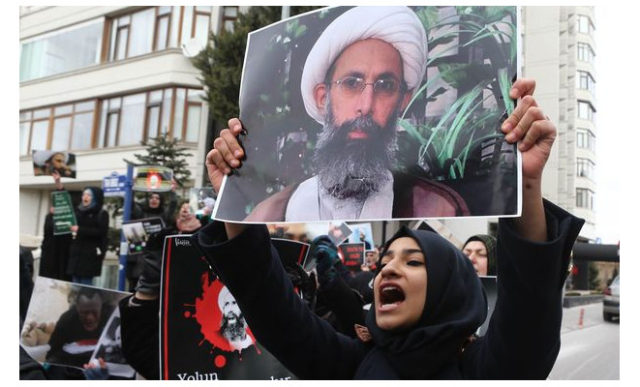Sheikh Nimr al-Nimr was a prominent voice in the struggle against Shia discrimination in Saudi Arabia. He played a large and symbolic role in the 2011-2012 demonstrations in the Eastern Province. As a result of his support for the peaceful protests, Saudi security forces arrested him in 2012 and sentenced him to death. His death sentence resulted in further protests and demonstrations, which intensified after his execution on 2 January 2016.
In early 2011, protesters marched in cities throughout Saudi Arabia, including Riyadh, Buraida, and the Eastern Province towns of Qatif, Awamiya, and Hofuf. They demanded the release of prisoners held without trial and defied an Interior Ministry statement issued on 5 March prohibiting public protests. Despite the ban, demonstrations in Qatif continued through 2011 and into 2012, while protests in Riyadh began again in December 2011. Security forces responded to the protests violently. They killed 20 people, and arrested over one hundred.
The protests in the Eastern Province were motivated not only by the plight of political prisoners held in detention without trial, but also by anti-Shia discrimination in the fields of religion, politics, and economics. Shia face discrimination in the education system, where pupils learn from Sunni teachers they are unbelievers. They face barriers in hiring practices, particularly in the government; only six Shia sit on the country’s 150-member Shura council, which advises the king. Despite being concentrated in the Saudi Arabia’s east, where its oil is concentrated, Eastern Province Shia remain some of the Kingdom’s poorest subjects.
In his support of the protests, Sheikh Nimr was critical of the government especially for creating and perpetuating the poor conditions of Shia in the country. To this end, he called for political and religious reforms, urged youths to call for change, and denounced ongoing state-sponsored repression and abuse. He gained popularity with the youths in the streets because of his rhetoric. Activists stated that Sheikh Nimr “speaks to what we are feeling in our hearts.” As a result of his popularity and support for the protests, Saudi security forces attempted to arrest him. After avoiding the authorities by moving from residence to residence, security forces arrested him in 2012. During the arrest, security forces shot and seriously wounded him.
Sheikh Nimr’s popularity grew exponentially since his arrest, which led to further unrest in the Eastern Province. The demonstrations continued when the Specialized Criminal Court sentenced him to death in October 2014. His execution on 2 January 2016 deepened the unrest in not only in Saudi Arabia’s east, but also in Bahrain.
Sheikh Nimr was a strong advocate for the rights of Shia in Saudi Arabia. He spoke out against the multi-faceted and systematic government-sponsored discrimination of Shia. As a prominent and popular voice in the community, Sheikh Nimr played a large and symbolic role in the protests in the Eastern Province. As a result, Saudi officials arrested him and sentenced him to death. This signaled the government would not end its campaign of Shia discrimination, but continue to discriminate against its Shia minority.
Tyler Pry is the Sheikh Nimr al-Nimr Advocacy Fellow at ADHRB





